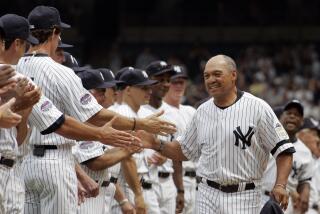Monte Irvin dies at 96; Hall of Famer had the chance to break baseball’s color barrier
- Share via
Monte Irvin, a Negro leagues star who turned down a chance to break baseball’s color barrier but went on to a Hall of Fame career with the New York Giants, has died. He was 96.
The National Baseball Hall of Fame and Museum said Irvin died Monday night of natural causes at his Houston home.
Jackie Robinson became the pioneer African American in modern-day baseball. But, had World War II not broken out, Irvin probably would have been the one.
An outstanding young player with the Newark Eagles of the Negro National League — his skills were favorably compared to those of Joe DiMaggio — Irvin was first on Negro leagues executives’ unofficial list to integrate baseball.
But he was drafted into the Army in 1943 at the peak of his athletic prowess and sent overseas with a segregated combat engineer unit that built and demolished bridges in France and Belgium.
He came home two years later having not played in that time and unsure of his skills. An inner ear infection affected his balance, and he said he was “getting over war nerves.”
So when Branch Rickey approached him about signing with the Brooklyn Dodgers, Irvin said no, and went back to Newark. Rickey later signed Robinson.
“Jackie did such a wonderful job,” Irvin said in an interview with the San Jose Mercury News. “It all worked out OK, and I have no regrets. None.”
Back in Newark, Irvin found his groove, hitting a league-high .401 as he led the Eagles to the 1946 pennant, then hit .462 with three home runs as the Eagles beat the Kansas City Monarchs in a seven-game Negro World Series.
He played winter ball in Puerto Rico, then Cuba, where he occasionally stood in against a wild-armed young pitcher named Fidel Castro.
In 1949, at age 30, he signed with the Giants two years after Robinson’s debut with the Dodgers. He took a pay cut, from $6,000 with the Eagles to $5,000 with the Giants.
His breakout season was 1951, when the Giants roared back from 13 games behind in August to beat the Dodgers on Bobby Thomson’s “shot heard round the world” for the National League pennant. He hit .312 with 24 home runs and a league-high 121 runs batted in during the regular season, then hit .458, going 11 for 24, and stole home in one game as the Giants were beaten by the Yankees in the World Series. That same season, Irvin, his protege Willie Mays and Hank Thompson gave big league baseball its first all-black outfield.
In 1952 he suffered a compound ankle fracture sliding into third base. Although he was voted to the National League All-Star team, he was unable to regain his former speed. Even so, he hit .329 the next season, when he reinjured the ankle.
“My body could not respond like it did,” he told the Kansas City Star in 2004. “But my heart could.”
He helped the Giants back to the World Series in 1954, when they beat the Cleveland Indians in four games. In eight major league seasons — he finished with the Chicago Cubs in 1956 — Irvin collected 731 hits for a career batting average of .293. He was elected to the Hall of Fame in 1973, as much in recognition of his Negro leagues play as for his major league accomplishments.
Montford Merrill Irvin was born Feb. 25, 1919, in Haleburg, Ala. His parents moved the family to New Jersey when he was a child, and he grew up there, earning all-state honors in baseball, football, basketball and track at Orange High School. He went to Lincoln University, a historically black school in Oxford, Pa., where he played football. He played baseball professionally with the Eagles in 1938 when he was 17, using the pseudonym Jimmy Nelson to protect his football eligibility at Lincoln.
He joined the Negro leagues “because there just wasn’t anything else open for me,” Irvin told the St. Petersburg (Fla.) Times in 1993. “I got tired of being broke all the time.”
After his playing career, Irvin worked as a scout for the New York Mets and in the office of then-Commissioner Bowie Kuhn, who presented Irvin at his Hall of Fame induction.
“Goodness knows what he might have achieved,” Kuhn said. “And never, do I feel, has baseball produced a kinder, more decent, more beloved man.”
Kupper is a former Times staff writer.
More to Read
Start your day right
Sign up for Essential California for the L.A. Times biggest news, features and recommendations in your inbox six days a week.
You may occasionally receive promotional content from the Los Angeles Times.







